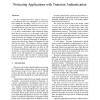Free Online Productivity Tools
i2Speak
i2Symbol
i2OCR
iTex2Img
iWeb2Print
iWeb2Shot
i2Type
iPdf2Split
iPdf2Merge
i2Bopomofo
i2Arabic
i2Style
i2Image
i2PDF
iLatex2Rtf
Sci2ools
103
click to vote
MOBISYS
2003
ACM
2003
ACM
Protecting Applications with Transient Authentication
Related Content
| Added | 24 Dec 2009 |
| Updated | 24 Dec 2009 |
| Type | Conference |
| Year | 2003 |
| Where | MOBISYS |
| Authors | Mark D. Corner, Brian Noble |
Comments (0)

